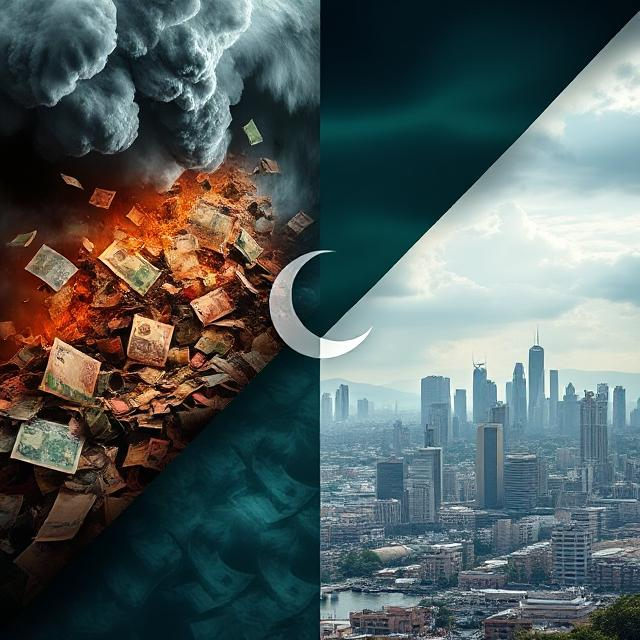Pakistan: Challenges and Hope for the Future
A Nation's Journey to Renewal
CEO
3/26/20254 min read


Pakistan, a nation rich in culture, history, and potential, is currently facing some of the most profound challenges in recent decades. From economic instability to deepening political divides, the future of Pakistan looks uncertain. As the country confronts critical issues affecting the lives of millions, it is essential to examine the root causes of these problems and understand what the future may hold for the nation.
Economic Crisis: A Nation Gripped by Inflation One of Pakistan’s most pressing concerns today is its economic crisis. The country’s economy has been in freefall, with inflation reaching record highs. The Pakistani rupee has been devalued against major currencies, significantly raising the cost of imported goods, including essential items such as food and fuel. The prices of everyday commodities are rising so rapidly that ordinary citizens are struggling to make ends meet.
Additionally, Pakistan’s debt burden is becoming a looming crisis. With increasing loans from international institutions like the IMF and China, the country’s fiscal space is shrinking, leaving little room for the government to maneuver. Many Pakistanis are now living paycheck to paycheck, and the younger generation is growing increasingly frustrated with the lack of job opportunities.
This economic crisis is directly impacting the social fabric of Pakistan, with millions falling deeper into poverty. The government’s inability to curb inflation and provide jobs is exacerbating social inequalities, with the most vulnerable groups bearing the brunt. While political leaders frequently promise reforms and new economic plans, results have been slow to materialize, leaving the public disillusioned.
Political Turmoil: Struggling for Stability The political landscape of Pakistan is as volatile as its economy. The nation is currently in the midst of intense political polarization. The country’s major political parties are embroiled in disputes, with opposition parties accusing the ruling government of corruption and unfair practices. This divide has only deepened after the recent elections, which many believe were not conducted fairly, leading to widespread protests and calls for new elections.
The political instability has led to a lack of direction in governance. The political elite seems more focused on maintaining power than solving the problems faced by ordinary Pakistanis. With many political leaders prioritizing their personal agendas over national interests, the public’s trust in their representatives is at an all-time low. This has resulted in a sense of cynicism among the people, who feel their voices are not being heard.
Moreover, the rise of new political movements and shifting alliances among established parties have further complicated matters. The political vacuum left by these struggles has created a scenario where governance is reactive rather than proactive, and long-term strategic planning is rare.
Social Struggles: The Toll on the People Behind the economic and political struggles lies the social toll these issues are taking on the average Pakistani. Education, healthcare, and basic infrastructure are all areas that have suffered under the weight of mismanagement and neglect.
Pakistan's education system, long in need of reform, is struggling to provide quality learning to its youth. With an outdated curriculum and underfunded schools, the country faces a crisis in human capital development. As the world moves forward in technology and innovation, Pakistan’s youth remains ill-equipped to compete on the global stage.
Similarly, the healthcare system in Pakistan remains underdeveloped, with limited access to quality medical care in rural areas. The country’s hospitals are overcrowded, and healthcare workers are often underpaid and overworked. These issues were particularly glaring during the COVID-19 pandemic, which exposed the country’s weak public health infrastructure.
The wealth gap is widening, with Pakistan’s elite continuing to enjoy privileges, while the majority of the population struggles to afford basic necessities. Poverty, unemployment, and a lack of social services are leading to increased crime and unrest in many parts of the country.
A Call for Change: What Lies Ahead? Despite these challenges, Pakistan has always shown resilience in the face of adversity. The people of the country are hardworking, resourceful, and determined to move forward. However, it is clear that change is needed at multiple levels. The government must take immediate steps to address the economic crisis, stabilize the currency, and provide employment opportunities. Reforming the tax system, boosting domestic industries, and attracting foreign investment are key areas that could help lift the economy.
Politically, Pakistan needs leaders who are committed to national progress rather than personal power. The nation requires transparent governance, fair elections, and a commitment to democratic values that can bridge the growing political divide. Only through cooperation and unity can Pakistan move toward a more stable political future.
Finally, Pakistan’s social infrastructure needs urgent attention. Investing in education and healthcare is not only essential for the well-being of its people but also for the country’s future growth. Creating opportunities for youth, improving public services, and ensuring equal rights for all citizens can help create a more just society.
Conclusion: As Pakistan stands at a crossroads, the country faces challenges that will define its future for generations to come. The economic crisis, political instability, and social struggles are not just problems to be solved—they are calls to action. The solutions lie in the hands of the government, political leadership, and the people themselves. If Pakistan can overcome these hurdles, it will mark the beginning of a new chapter. Only by uniting, reforming, and committing to a shared vision can Pakistan unlock its true potential and rise above the challenges of today.


Thank you for visiting EaglesSky – where innovation, creativity, and growth come together.
We are dedicated to empowering you with books, poetry, skill development content, insightful blogs, and expert guidance. Stay connected and continue your journey with us!
